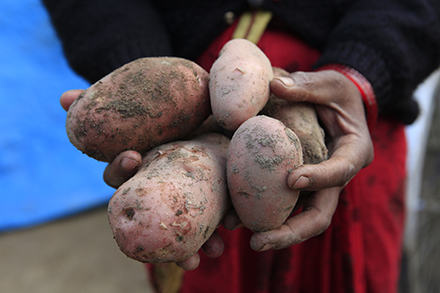Watch Ganga Khanal, in a mustard field behind her home in Nepal's southern Terai region, explain in this powerful interview exactly how two goats and the encouragement of her women's group gave her the confidence and the means to change her own life and her family's for the better.
In honor of International Women’s Day, this week we’re sharing the stories of the amazing women Heifer works with who have taken the gifts of animals and training and run with them, leading to extraordinary results for themselves and their communities.
March 8 was International Women’s Day—a day to celebrate women and their contributions to the world. Despite this global, 24-hour celebration, women farmers are often overlooked. Acknowledging the important work of women farmers in agriculture and livestock development is necessary to raise their socioeconomic status. To close the hunger and poverty gap and ensure food and nutrition security, it is essential to invest in these women.
USAID reports that more than 70 percent of Nepal’s population works in the agriculture sector, and more women than men report it as their primary source of income. However, the role of women in agriculture and livestock development is significantly inferior. Women are often relegated to unpaid or poorly paid labor-intensive tasks. They spend their days fetching water for their family or fodder for their livestock, while their male counterparts are accessing extension services or selling their farm produce.
Heifer Nepal has been investing in women farmers since 1997, equipping them with skills and tools to increase their incomes and lift their communities from poverty to sustainability and resilience. Through capacity building and income generation trainings and by establishing connections to agro-vet services and business hubs, Heifer propels women to the forefront of the livestock and agriculture industry.
A recent study of Heifer’s project impact in Nepal shows that families have been able to increase their income by 68 percent within three years. This substantial growth allows these farmers to meet basic needs—consistently healthy nutrition, education for children, health care—which were out of reach not long ago.
Together we can achieve equality in agriculture in Nepal—your gift will help.

When women are able to engage in the more rewarding aspects of agriculture, such as participating in trainings and selling their produce at market, they are empowered socially and economically. According to the Food and Agriculture Organization, if women had the same access to land and other productive resources as men, they could increase their farm yields by 20-30 percent. Imagine the millions of hungry people who will be fed and nourished with a more level agricultural playing field.
In Nepal’s post-disaster scenario, the need to invest in women farmers is more urgent than ever before. According to a recent United Nations assessment report, the Nepali households most vulnerable to food insecurity are those led by single females, as most of the country’s earthquake-affected districts have high rates of male migration. The country’s agricultural strategies need to recognize women as key contributors in this vital sector. Together, we can ensure a just society and an enabling environment that supports women farmers, who, in turn, support the world through increased crop yields, revival of local economies and the achievement food security.